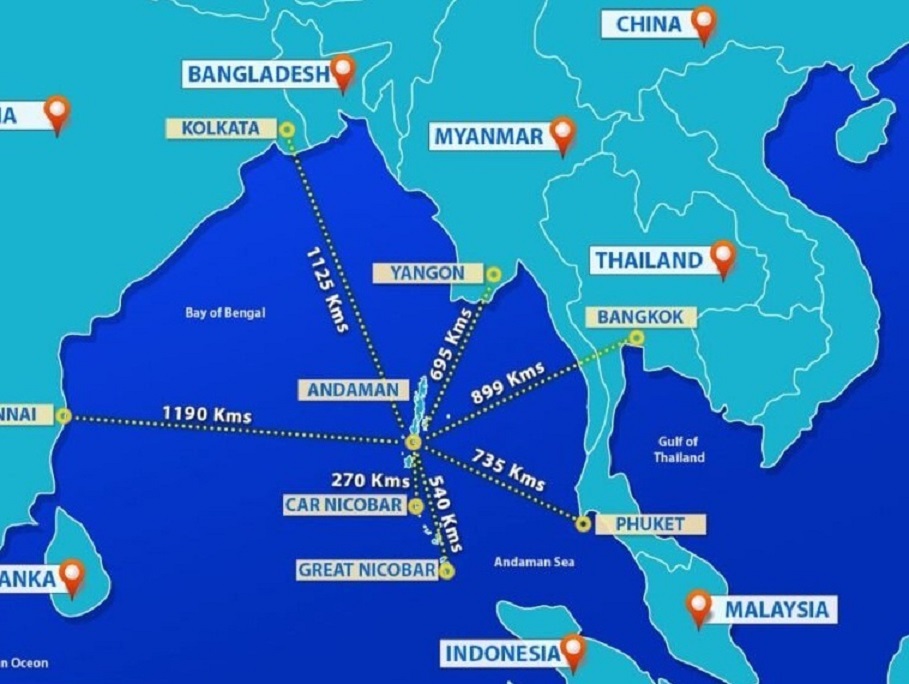- Home
- Prelims
- Mains
- Current Affairs
- Study Materials
- Test Series
 EDITORIALS & ARTICLES
EDITORIALS & ARTICLES
Why Andaman and Nicobar Islands are key to Indo-Pacific security?
The Andaman and Nicobar Islands, historically significant due to their use as a penal colony by the British following the 1857 War of Independence, have evolved into a strategic asset for India. Their geographical location and the historical context of near loss to foreign powers underscore their importance. The liberation of these islands during World War II by the INA and subsequent developments highlights their strategic significance.
Issues
- Historical Context and Strategic Neglect: Initially, after the 1857 War of Independence, the British established a penal colony in the A&N islands, which later became known as Kalapani. Post-independence, the islands suffered from benign neglect by New Delhi until a Chinese submarine was reportedly sighted in 1962, prompting the establishment of a naval garrison.
- Japanese Occupation and INA’s Role: During World War II, the islands were occupied by the Japanese and were symbolically liberated by Netaji Subhas Chandra Bose and the Indian National Army (INA) in 1943. However, the British reoccupied the islands after the Japanese surrender in 1945.
- Post-Independence Security Concerns: Post-independence, there were moments when the sovereignty over the islands was questioned or threatened, notably during the 1965 India-Pakistan hostilities and the post-Kargil War period. These instances underscored the islands’ strategic vulnerability.
- Establishment of Andaman Nicobar Command (ANC): In response to security reviews and the strategic importance of the islands, the ANC was established in 2001 as India’s first joint/unified operational comman Despite its success, the model has not been widely replicated in the Indian military.
- Geographical Significance and Threats: The unique geography of the A&N islands, located near critical maritime routes and neighboring countries, presents both strategic opportunities and vulnerabilities. The possibility of surreptitious occupation by neighboring states and the frequent transits of Chinese naval vessels highlight the need for robust security measures.
- Security Infrastructure and Maritime Domain Awareness: The ANC must maintain comprehensive maritime domain awareness and be equipped with adequate defensive and offensive capabilities to deter intrusions and manage threats, including from state and non-state actors.
- Strategic Importance in the Indo-Pacific Region: The A&N islands are crucial for monitoring and controlling the flow of maritime traffic through the Strait of Malacca, a critical choke point for global trade and oil shipments. This strategic position offers India the potential to project power and foster cooperation with like-minded partners in the Indo-Pacific region.
- Future Strategy and Regional Cooperation: The reported security infrastructure upgrades are part of a broader strategy to transform the A&N islands into a maritime bastion. This strategy aims not only to enhance India’s defensive capabilities but also to enable it to play a more significant role in regional maritime cooperation, including disaster relief, anti-piracy efforts, and ensuring peace and tranquility in the Indo-Pacific.
Road ahead
- Strengthening the Andaman Nicobar Command (ANC): The ANC should be further strengthened with advanced defensive and offensive capabilities, including anti-submarine warfare assets to counter the presence of Chinese naval forces. This includes deploying additional surface ships, submarines, and maritime patrol aircraft with modern sensors and weapons. Rapid-reaction forces should be enhanced with amphibious and airlift capabilities to ensure swift deployment and mobility across the archipelago.
- Networked Maritime Domain Awareness: Implement a comprehensive maritime domain awareness system by integrating radars, satellites, unmanned vehicles, and aircraft to monitor and secure the vast maritime zone around the A&N Islands.
- Diplomatic Engagement and Regional Cooperation: India should actively engage with like-minded countries to foster cooperation and ensure maritime security in the Indo-Pacific. This includes conducting joint naval exercises, sharing intelligence, and collaborating on marine surveillance.
- Port Blair as a Regional Hub: Transform Port Blair into a regional hub for navies, focusing on interoperability in disaster relief, medical aid, anti-piracy operations, and search and rescue missions. This initiative would not only enhance regional maritime security but also build goodwill among neighboring countries.
- Strategic Infrastructure Upgradation: Accelerate the development of strategic infrastructure on the A&N Islands, including upgrading naval bases, airfields, and surveillance facilities. This would enhance India’s ability to project power and monitor strategic sea lanes.
- Addressing the “Malacca Dilemma”: The Great Nicobar Island’s strategic location should be utilized to monitor and, if necessary, control the western entrance/exit of the Malacca Strait. This positioning should be leveraged to ensure the security of one of the world’s busiest sea lanes, addressing concerns about the “Malacca Dilemma.“

Recent efforts to upgrade security infrastructure in the Andaman and Nicobar Islands are crucial for enhancing India’s strategic posture in the Indo-Pacific region. These islands not only serve as a vital point for monitoring key maritime routes but also offer opportunities for India to project power and foster regional cooperation. The focus on these islands aligns with broader strategic objectives to ensure peace and stability in the region.









 Latest News
Latest News General Studies
General Studies